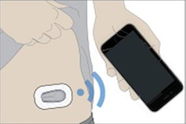Investigators:
- Associate Professor Martin de Bock (PI)
- Associate Professor Ben Wheeler (PI)
- Dr Ryan Paul (PI)
- Dr Alisa Boucsein
Reducing the risk of complications in Type 2 Diabetes
Preventing some of the complications associated with type 2 diabetes, such as kidney failure and eyesight problems, relies on controlling blood glucose levels. However, improving this glycaemic control remains a significant challenge for those living with this disease.
Continuous glucose monitoring (CGM) is well established for assisting those with type 1 diabetes to improve health outcomes and reduce disease burden. However, there are only limited data on the use of this device for type 2 diabetes, particularly the newer, more accurate, CGM devices which do not require capillary glucose calibration.
Glycaemic outcomes in people with type 2 diabetes initiating CGM
This multi-site, 3-month randomized controlled study will be followed by a 3-month continuation phase, where those who were initially randomized to routine care will cross over into the intervention arm, using the Dexcom G6 CGM. The study will enrol 80 participants.
All participants will receive the same nurse-led diabetes management schedule to help adjust insulin titration based on blood glucose levels.
In addition, the main study will be followed by a 12-month extension study, where those who volunteer to participate will use the CGM system for a further 12 months to see if any improvements in blood glucose control are sustained. This allows for a longer data collection period and also an assessment of any potential adverse events, which occur at a very low rate.
Modern real-time CGM has great potential to be utilized by people living with type 2 diabetes, to improve glycaemic outcomes and to reduce the long-term complications and economic burden associated with this disease.
Are you eligible to join the study?
- Do you have type 2 diabetes and use insulin?
- Do you have a smartphone or computer/laptop and internet access?
To be eligible to join the 2GO-CGM study, you need to be at least 16 years old, have type 2 diabetes, and have an HbA1c of 64mmol/mol or higher.
If you live in Canterbury, Otago, Southland or Waikato and would like more information about this study, we would love to hear from you.
Email the study co-ordinators: 2GOCGM@gmail.com
Health and Disability Ethics Committee reference: 21/CEN/75
Funding
This research project receives funding from Dexcom, Inc., the device manufacturer.

